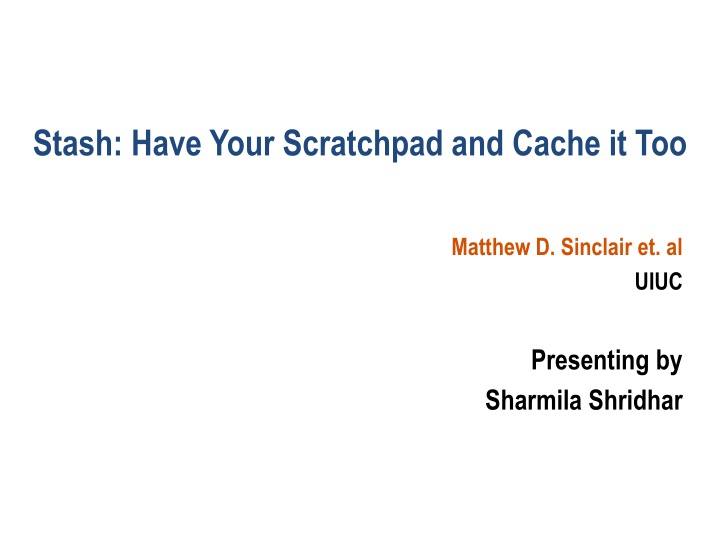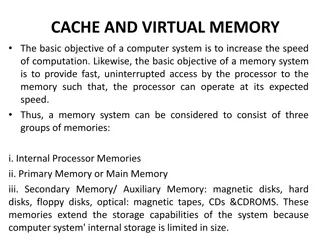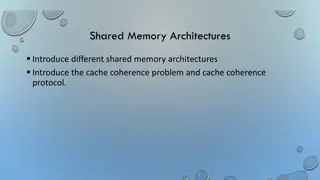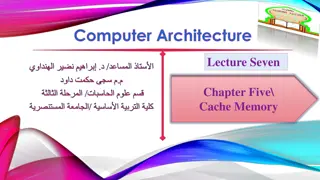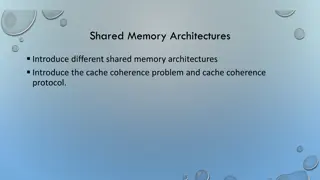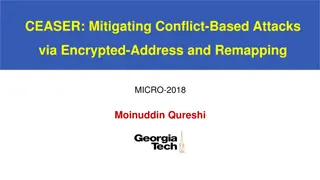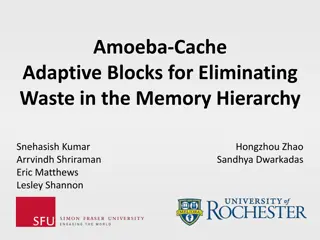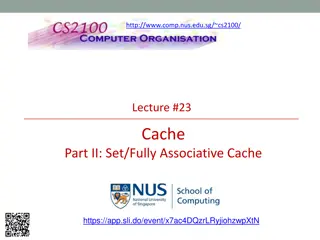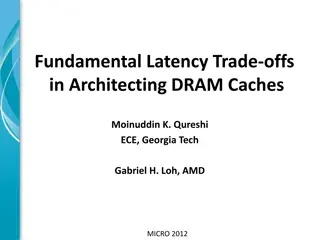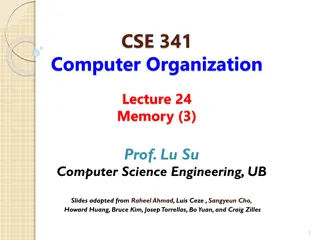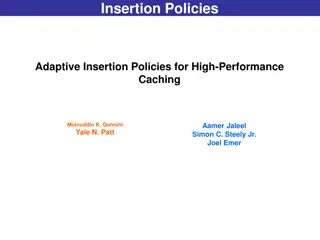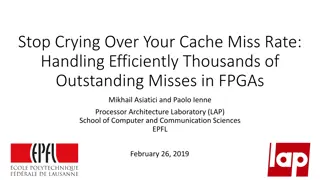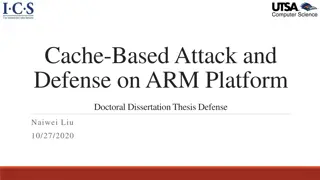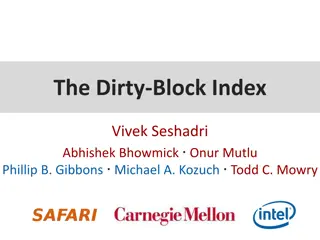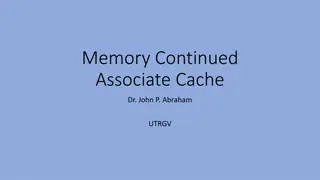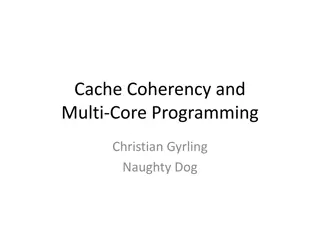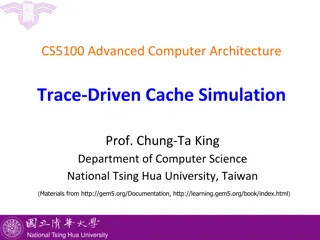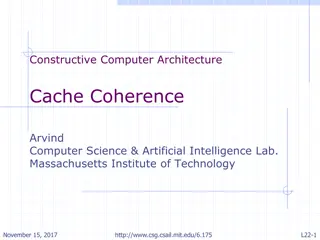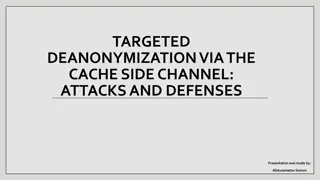Stash: Have Your Scratchpad and Cache it Too
Essential energy-efficient memory hierarchy mechanisms for heterogeneous SoCs using specialized memories like scratchpads, FIFOs, and stream buffers. Can specialized memories be globally addressable and coherent? Explore the benefits of integrating scratchpad cache with a global address space and coherent system.
Download Presentation

Please find below an Image/Link to download the presentation.
The content on the website is provided AS IS for your information and personal use only. It may not be sold, licensed, or shared on other websites without obtaining consent from the author.If you encounter any issues during the download, it is possible that the publisher has removed the file from their server.
You are allowed to download the files provided on this website for personal or commercial use, subject to the condition that they are used lawfully. All files are the property of their respective owners.
The content on the website is provided AS IS for your information and personal use only. It may not be sold, licensed, or shared on other websites without obtaining consent from the author.
E N D
Presentation Transcript
Stash: Have Your Scratchpad and Cache it Too Matthew D. Sinclair et. al UIUC Presenting by Sharmila Shridhar
SoCs Need an Efficient Memory Hierarchy Energy-efficient memory hierarchy is essential Heterogeneous SoCs use specialized memories E.g., scratchpads, FIFOs, stream buffers, Scratchpad Cache Directly addressed: no tags/TLB/conflicts Compact storage: no holes in cache lines X X 2
SoCs Need an Efficient Memory Hierarchy Energy-efficient memory hierarchy is essential Heterogeneous SoCs use specialized memories E.g., scratchpads, FIFOs, stream buffers, Scratchpad Cache Directly addressed: no tags/TLB/conflicts Compact storage: no holes in cache lines Global address space: implicit data movement Coherent: reuse, lazy writebacks X X X X Can specialized memories be globally addressable, coherent? Can we have our scratchpad and cache it too? 3
Can We Have Our Scratchpad and Cache it Too? Scratchpad Cache Stash + Global address space + Coherent + Directly addressable + Compact storage Make specialized memories globally addressable, coherent Efficient address mapping Efficient coherence protocol Focus: CPU-GPU systems with scratchpads and caches Up to 31% less execution time, 51% less energy 4
Outline Motivation Background: Scratchpads & Caches Stash Overview Implementation Results Conclusion 5
Global Addressability Scratchpads Part of private address space: not globally addressable Explicit movement , pollution, poor conditional accs support GPU CPU Registers Cache Scratchpad Cache L2 $ Bank L2 $ Bank Interconnection n/w Cache + Globally addressable: part of global address space Implicit copies, no pollution, support for conditional accesses 6
Coherence: Globally Visible Data Scratchpads Part of private address space: not globally visible Eager writebacks and invalidations on synchronization Cache + Globally visible: data kept coherent Lazy writebacks as space is needed, reuse data across synch 7
Stash A Scratchpad, Cache Hybrid Scratchpad Cache Stash Directly addressed: no tags/TLB/conflicts Compact storage: no holes in cache lines Global address space: implicit data move. Coherent: reuse, lazy writebacks X X X X 8
Outline Motivation Background: Scratchpads & Caches Stash Overview Implementation Results Conclusion 9
Stash: Directly & Globally Addressable // A is global mem addr // Compiler info: stash_base[500] -> A (M0) // Rk = M0 (index in map) // A is global mem addr // scratch_base == 500 for (i = 500; i < 600; i++) { reg ri = load[A+i-500]; scratch[i] = ri ; } reg r = scratch_load[505]; reg r = stash_load[505, Rk ]; 500 505 500 505 Map 500 A M0 Stash Scratchpad Accelerator Accelerator Generate load[A+5] Like scratchpad: directly addressable (for hits) Like cache: globally addressable (for misses) Implicit loads, no cache pollution 10
Stash: Globally Visible Stash data can be accessed by other units Needs coherence support GPU CPU Registers Map Stash $ Cache L2 $ Bank L2 $ Bank Interconnection n/w Like cache Keep data around lazy writebacks Intra- or inter-kernel data reuse on the same core 11
Stash: Compact Storage Global Stash . . . Caches: cache line granularity storage ( holes waste) Do not compact data Like scratchpad, stash compacts data 12
Outline Motivation Background: Scratchpads & Caches Stash Overview Implementation Results Conclusion 13
Stash Software Interface Software gives a mapping for each stash allocation AddMap(stashBase, globalBase, fieldSize, objectSize, rowSize, strideSize, numStrides, isCoherent) 14
Stash Hardware Stash-Map Stash instruction VP-map VA TLB RTLB Map index table PA/ VA S t a t e Data Array V Stash base VA base Field size, Object size Row size, Stride size, #strides isCoh #Dirty Data 15
Stash Instruction Example Stash-Map stash_load[505, Rk]; VP-map VA TLB RTLB Map index table PA S t a t e Data Array V Stash base VA base Field size, Object size Row size, Stride size, #strides isCoh #Dirty Data 16
Lazy writebacks Stash writebacks happen lazily Chunks of 64B with per chunk dirty bit On store miss, for the chunk set dirty bit update stash map index Increment #DirtyData counter On eviction, Get PA using stash map index and writeback Decrement #DirtyData counter 17
Coherence Support for Stash Stash data needs to be kept coherent Extend a coherence protocol for three features Track stash data at word granularity Capability to merge partial lines when stash sends data Modify directory to record the modifier and stash-map ID Extension to DeNovo protocol Simple, low overhead, hybrid of CPU and GPU protocols 18
DeNovo Coherence (1/3) [DeNoVo: Rethinking the Memory Hierarchy for Disciplined Parallelism] Designed for Deterministic code w/o conflicting access Line granularity tags, word granularity coherence Only three coherence states Valid, Invalid, Registered Explicit self invalidation at the end of each phase Lines written in previous phase-> Registered state Keep valid data or registered core ID in Shared LLC 19
DeNovo Coherence (2/3) Private L1, shared L2; single word line Data-race freedom at word granularity Read No transient states Read Invalid Valid No invalidation traffic Write Write No directory storage overhead Registered Read, Write No false sharing (word coherence) 20
DeNovo Coherence (3/3) Extenstions for Stash Store Stash Map ID along with registered core ID Newly written data in Registered state At the end of the kernel, self-invalidate entries that are not registered In contrast, scratchpad invalidates all the entries Only three states, 4th state used for Writeback 21
Outline Motivation Background: Scratchpads & Caches Stash Overview Implementation Results Conclusion 22
Evaluation Simulation Environment GEMS + Simics + Princeton Garnet N/W + GPGPU-Sim Extend McPAT and GPUWattch for energy evaluations Workloads: 4 microbenchmarks: implicit, reuse, pollution, on-demand Heterogeneous workloads: Rodinia, Parboil, SURF 1 CPU Core (15 for microbenchmarks) 15 GPU Compute Units (1 for microbenchmarks) 32 KB L1 Caches, 16 KB Stash/Scratchpad 23
Evaluation (Microbenchmarks) Execution Time Implicit Implicit 100% 80% Scr C Scr+D = All requests use scratchpad w/ DMA St = Converts scratchpad requests to stash = Baseline configuration = All requests use cache 60% 40% 20% 0% Scr Scr Scr Scr Scr Scr+D Scr+D Scr+D Scr+D Scr+D St St St St St C C C C C 24
Evaluation (Microbenchmarks) Execution Time Implicit 100% 80% 60% 40% 20% 0% Scr Scr Scr Scr Scr Scr+D Scr+D Scr+D Scr+D Scr+D St St St St St C C C C C No explicit loads/stores 25
Evaluation (Microbenchmarks) Execution Time Implicit Pollution 100% 80% 60% 40% 20% 0% Scr Scr Scr Scr Scr Scr+D Scr+D Scr+D Scr+D Scr+D St St St St St C C C C C No cache pollution 26
Evaluation (Microbenchmarks) Execution Time Implicit Implicit Pollution On-Demand Reuse 100% 80% 60% 40% 20% 0% Scr Scr Scr Scr Scr Scr+D Scr+D Only bring needed data Scr+D Scr+D Scr+D St St St St St C C C C C 27
Evaluation (Microbenchmarks) Execution Time Implicit Implicit Pollution On-Demand Reuse 100% 80% 60% 40% 20% 0% Scr Scr Scr Scr Scr Scr+D Scr+D Scr+D Data compaction, reuse Scr+D Scr+D St St St St St C C C C C 28
Evaluation (Microbenchmarks) Execution Time Implicit Implicit Pollution On-Demand Reuse Average 100% 80% 60% 40% 20% 0% Scr Scr Scr Scr Scr Scr+D Scr+D Scr+D Scr+D Scr+D St St St St St C C C C C Avg: 27% vs. Scratch, 13% vs. Cache, 14% vs. DMA 29
Evaluation (Microbenchmarks) Energy GPU Core+ L1 D$ Scratch/Stash On-Demand L2 $ N/W Implicit Pollution Reuse Average 100% 80% 60% 40% 20% 0% Scr+D Scr+D Scr+D Scr+D Scr+D Scr St St St St St Scr Scr Scr Scr C C C C C Avg: 53% vs. Scratch, 36% vs. Cache, 32% vs. DMA 30
Evaluation (Apps) Execution Time SGEMM ST SURF BP NW PF AVERAGE 106 102 103 103 100% 80% Scr C St = Reqs use type specified by original app = All reqs use cache = Converts scratchpad reqs to stash 60% 40% 20% 0% Scr C St Scr C St Scr C St Scr C St Scr C St Scr C St Scr C St Scr C St 31
Evaluation (Apps) Execution Time SGEMM ST LUD 121 SURF BP NW PF AVERAGE 106 102 103 103 100% 80% 60% 40% 20% 0% Scr C St Scr C St Scr C St Scr C St Scr C St Scr C St Scr C St Scr C St Avg: 10% vs. Scratch, 12% vs. Cache (max: 22%, 31%) Source: implicit data movement Comparable to Scratchpad+DMA 32
Evaluation (Apps) Energy GPU Core+ BP L1 D$ Scratch/Stash SGEMM L2 $ N/W LUD NW SURF ST AVERAGE PF 168 120 126 180 128 108 100% 80% 60% 40% 20% 0% Scr C St Scr C St Scr C St Scr C St Scr C St Scr C St Scr C St Scr C St Avg: 16% vs. Scratch, 32% vs. Cache (max: 30%, 51%) 33
Conclusion Make specialized memories globally addressable, coherent Efficient address mapping (only for misses) Efficient software-driven hardware coherence protocol Stash = scratchpad + cache Like scratchpads: Directly addressable and compact storage Like caches: Globally addressable and globally visible Reduced execution time and energy Future Work: More accelerators & specialized memories; consistency models 34
Critique In GPUs, data in shared memory has the visibilty per thread block. Use syncthreads to ensure data is available. How is that behavior implemented? Else multiple threads can encounter miss on same data. How is it handled? Why don t they compare Scratchpad+DMA for GPU applications results? 35
